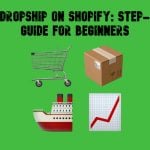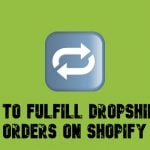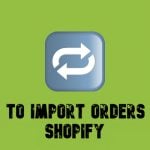SaleHoo Dropshipping Review 2026: Is SaleHoo Worth It for Your Shopify Store?
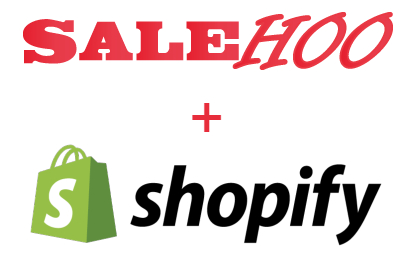
Dropshipping platforms differ significantly in terms of the features and opportunities they provide. Consequently, choosing the right one can make or break your Shopify business. But how to select a reliable partner that will perfectly suit your e-commerce business? In our earlier guide on the best dropshipping suppliers for Shopify, we compared 24 of the top players in the market. Now it’s time to zoom in on one of the most talked-about solutions: .
In this SaleHoo dropshipping review, we explain what SaleHoo is, how it works with Shopify, and whether the platform is legit and worth it in 2026. You’ll also get a breakdown of SaleHoo pricing, pros and cons, and integration details, so you can decide if it’s the right tool for your e-commerce strategy. Let’s dive in!
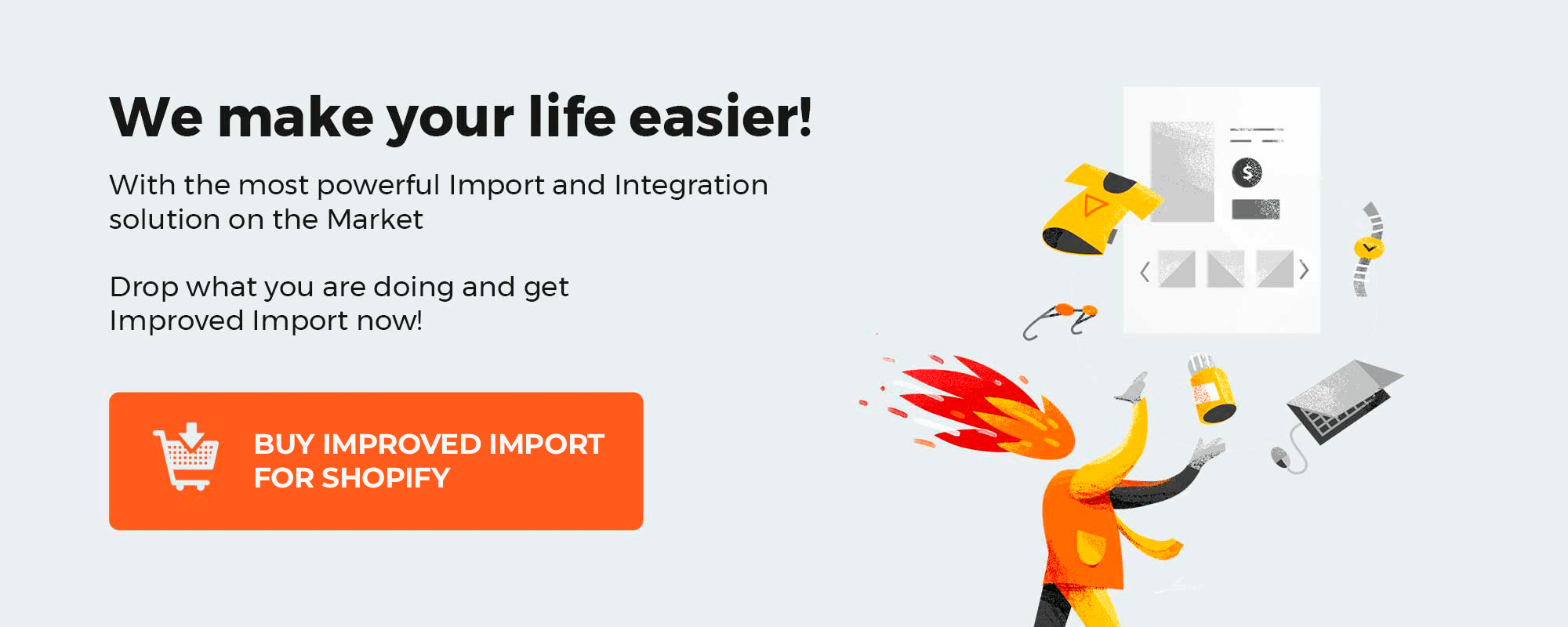
Table of contents
What is SaleHoo?
In its essence, SaleHoo is a wholesale and dropshipping directory designed to help e-commerce merchants source products from trusted suppliers. However, it is way more complex if you zoom in.
Founded in 2005 in New Zealand, SaleHoo has evolved into a global platform connecting sellers with over 8,000 vetted suppliers and more than 2.5 million products across various categories, including clothing, electronics, toys, beauty, and home goods.
Unlike many rival marketplaces, SaleHoo places a strong emphasis on legitimacy and supplier verification, making it easier for you, as a Shopify entrepreneur, to avoid scams and unreliable vendors. This is one of the main reasons why the question “Is SaleHoo legit?” comes with a positive answer, making SaleHoo a trusted name in the dropshipping space.
Core Features of SaleHoo: Why It Is More Than a Dropshipping Directory
SaleHoo combines supplier access with tools and resources that make running a dropshipping or wholesale business more efficient:
- Wholesale Directory – The platform provides access to thousands of pre-vetted wholesalers, manufacturers, and dropshippers. Each supplier goes through a screening process to ensure reliability, product authenticity, and safe business practices.
- Market Research Tools – SaleHoo’s Market Research Labs analyze product trends, demand levels, and competition. These insights can help you identify profitable products before adding them to a Shopify store.
- Shopify Integration – Through SaleHoo Dropship, you can import products directly to your Shopify store, sync inventory, and manage orders in a few clicks — eliminating manual uploads.
- Training & Resources – SaleHoo Educate provides online courses, guides, and webinars focused on dropshipping, wholesale sourcing, and scaling an e-commerce business.
- Community & Support – A large community of e-commerce sellers shares tips and experiences, while SaleHoo’s support team assists with platform navigation and supplier issues.
How Does SaleHoo Dropshipping Work?
At its core, SaleHoo dropshipping is designed to help Shopify entrepreneurs connect with verified suppliers and import their products directly into an online store. Instead of relying on unverified marketplaces or spending hours searching for suppliers on your own, SaleHoo gives you a streamlined process to source, evaluate, and sell products with confidence.
To achieve this goal, every SaleHoo plan includes two core components:
- SaleHoo Directory – a vetted database of more than 8,000 wholesalers and dropshippers.
- SaleHoo Dropship – automation tools that integrate with Shopify, letting you import products, sync inventory, and manage orders seamlessly.
SaleHoo Directory: Verified Supplier Network
As we’ve already mentioned, the SaleHoo Directory provides access to thousands of suppliers across categories like fashion, electronics, beauty, home goods, toys, and more. Each supplier, in turn, is thoroughly vetted for legitimacy, product quality, and reliability.
This means you can:
- Find suppliers you can trust — no scams, counterfeit risks, or shady contacts.
- Negotiate terms directly — including minimum order quantities (MOQs), prices, and shipping.
- Explore niches confidently — backed by SaleHoo’s market research data and supplier reports.
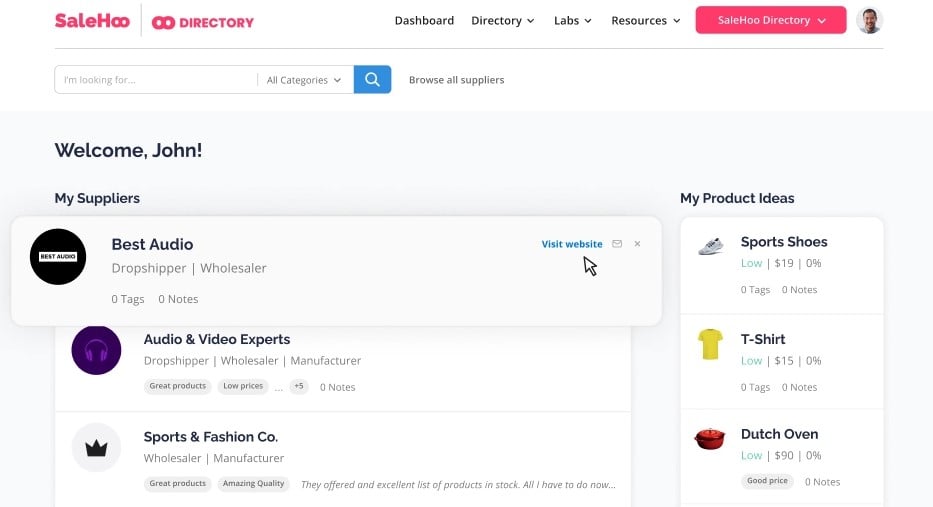
💡 Example: If you want to launch a store selling eco-friendly reusable bottles, you can use SaleHoo Directory to identify verified manufacturers, request samples, and confidently build your product line without gambling on random suppliers.
SaleHoo Dropship: Shopify Automation
The SaleHoo Dropship feature takes things a step further by automating product sourcing and management. Instead of uploading spreadsheets to your Shopify store and editing listings manually, you can:
- Import products instantly — SaleHoo lets you add items from a supplier catalog straight into your Shopify store with descriptions and images.
- Stay in sync — The platform provides the ability to synchronize inventory levels and pricing updates between your e-commerce website and the selected suppliers automatically, reducing the risk of overselling.
- Automate fulfillment — When customers place orders, you no longer have to inform your partner about that since the corresponding information is transferred to automatically.
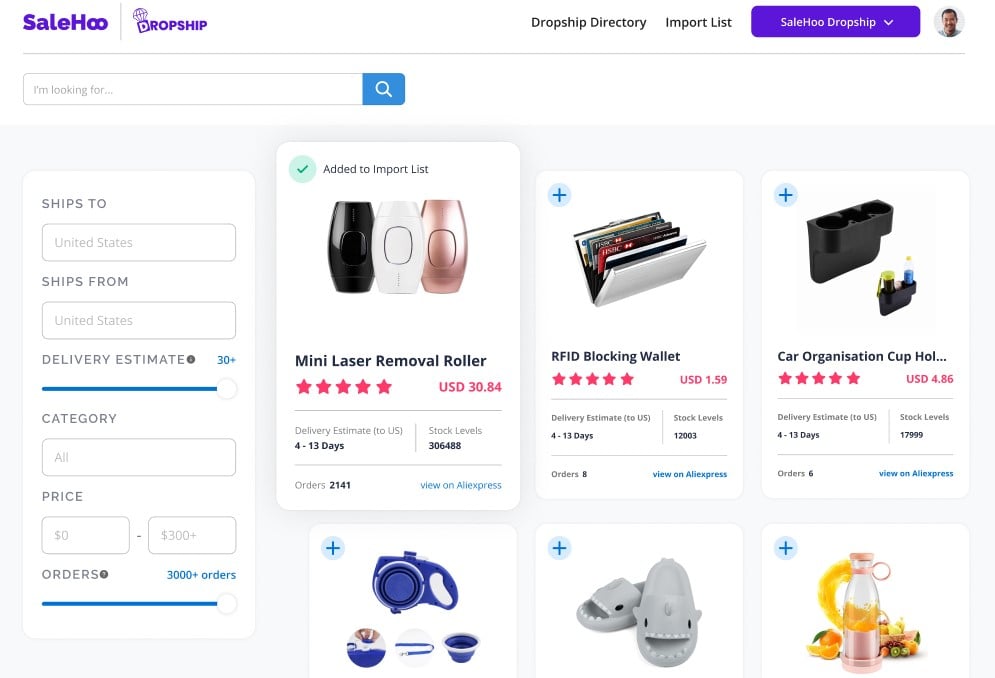
💡 Example: Want to add trending wireless earbuds to your store? With SaleHoo Dropship, you can publish the listing in just a few clicks, and if your supplier adjusts stock or pricing, those updates sync automatically with Shopify. The information about each new purchase is instantly exported to the supplier.
Which Features Should You Focus On?
The beauty of SaleHoo’s structure is that you don’t have to choose between the Directory and Dropship — all plans include both.
- Use the Directory when you want to explore niches, compare suppliers, or negotiate deals.
- Use Dropship automation when you want speed, convenience, and seamless Shopify integration.
Together, these features make SaleHoo dropshipping flexible enough for beginners who need step-by-step guidance, and powerful enough for experienced sellers who want automation and scalability.
Is SaleHoo Legit?
One of the first questions new entrepreneurs ask is: “Is SaleHoo legit or just another dropshipping scam?” It’s a fair concern, given the number of unreliable platforms out there. The good news is that SaleHoo has built its reputation over nearly two decades as a trusted resource for e-commerce sellers.
Here are the key trust factors that prove SaleHoo’s legitimacy:
- Years in business – Founded in 2005, SaleHoo has been operating for more than 18 years, serving thousands of entrepreneurs worldwide. This long track record sets it apart from short-lived tools that appear and disappear in the dropshipping space.
- Verified suppliers – Every wholesaler and dropshipper listed in the SaleHoo Directory goes through a strict vetting process. This ensures products are authentic, suppliers are reliable, and merchants avoid the risks of scams, counterfeits, or poor fulfillment practices.
- Refund policy – SaleHoo offers a 60-day money-back guarantee, giving new users peace of mind when testing the platform. If it doesn’t work for your business, you can cancel and receive a refund.
- Positive user reviews – SaleHoo is consistently praised in user feedback for safe supplier transactions, helpful customer support, and reliable sourcing tools. Many dropshippers highlight the value of combining supplier access with automation and training resources.
Taken together, these factors confirm that SaleHoo is 100% legit. It’s not a “get-rich-quick” scheme or a magic solution to e-commerce success. Instead, it’s a practical toolkit designed to reduce supplier risk, streamline product sourcing, and give Shopify entrepreneurs the structure they need to grow confidently.
👉 Bottom line: If your goal is to build a sustainable online store with verified suppliers and automation support, SaleHoo is a safe and credible choice.
SaleHoo Pricing: Plans Explained
When it comes to choosing the right dropshipping tool, pricing plays a major role in deciding whether a platform is truly worth it. And SaleHoo won’t disappoint you.
SaleHoo pricing is structured into three plans — Starter, Pro, and Enterprise — each tailored to different stages of your e-commerce journey. You can either pay annually or choose a lifetime option with a one-time payment.
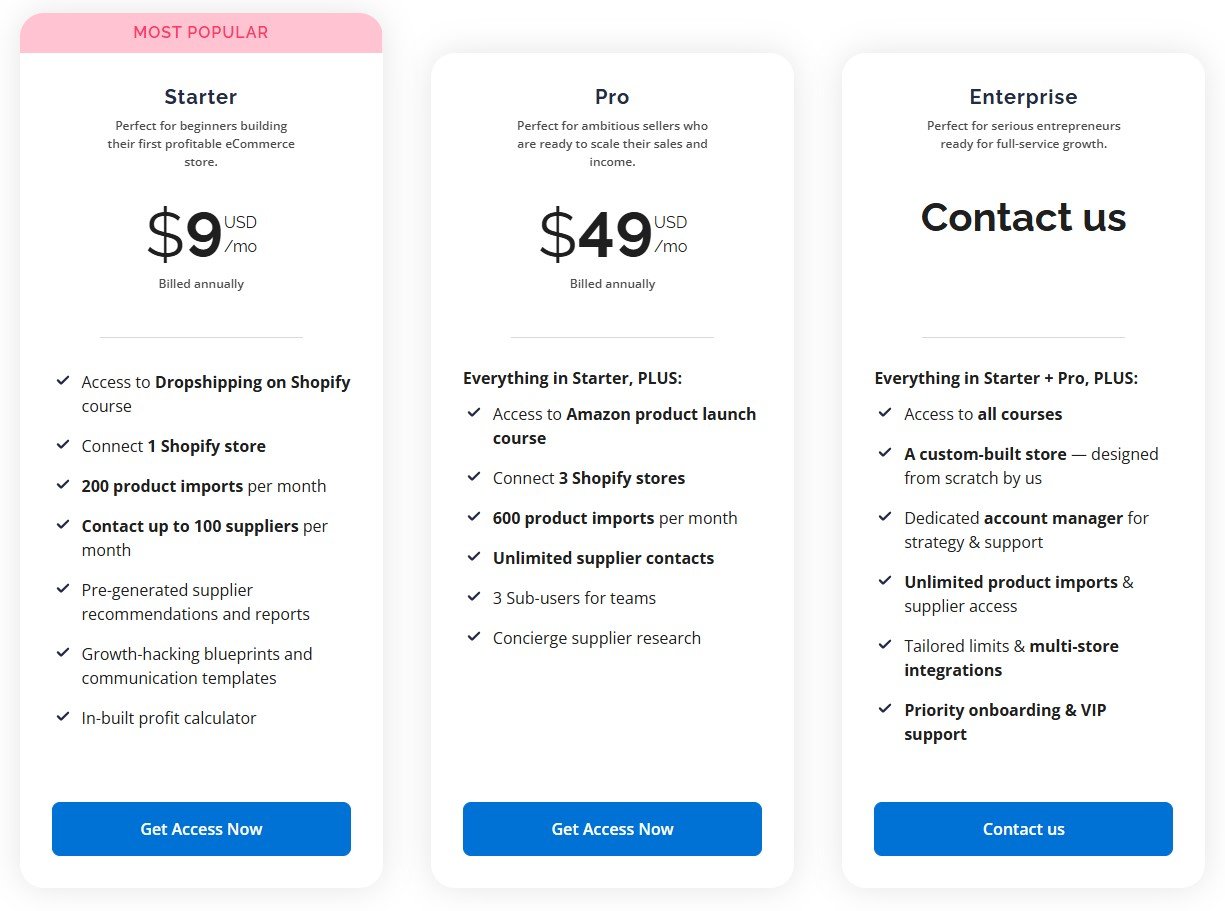
Starter Plan – Affordable Entry Point for Beginners
At just $9 per month (billed annually) or a $299 lifetime payment, the Starter plan is the most affordable way to begin with SaleHoo dropshipping. It’s designed for newcomers who want to launch their first profitable Shopify store without heavy investment.
With Starter, you can connect a single Shopify store and import up to 200 products each month. To help you source confidently, you also get access to pre-generated supplier recommendations and reports, along with the ability to contact up to 100 suppliers monthly.
What makes this plan especially valuable for beginners is the educational support. Starter includes the Dropshipping on Shopify course, growth-hacking blueprints, and communication templates — all practical resources that shorten the learning curve. Plus, the built-in profit calculator helps you estimate margins before adding a product to your catalog.
👉 Best for: Sellers starting their first store who want to keep costs low while accessing trusted suppliers and hands-on learning resources.
Pro Plan – Scaling Up Your Dropshipping Business
For those ready to grow, the Pro plan costs $49 per month (billed annually) or a $1,699 lifetime payment. It builds on everything in Starter and removes many of the entry-level limits.
With Pro, you can connect up to three Shopify stores, import 600 products per month, and enjoy unlimited supplier contacts. This flexibility is critical once your store begins generating consistent sales and you need to expand your product range without restrictions.
The Pro plan also introduces powerful extras: access to the Amazon product launch course for multi-channel growth, concierge supplier research to help you find reliable vendors in competitive niches, and three sub-user accounts for your team.
👉 Best for: Ambitious sellers who are scaling fast and need more product imports, broader supplier access, and advanced training.
Enterprise Plan – Full-Service Growth Solution
The Enterprise plan is tailored for established businesses that want a completely managed solution. Pricing is provided on request, reflecting the customized nature of this package.
With Enterprise, you get everything in Starter and Pro, plus unlimited product imports, unrestricted supplier access, and tailored limits to match your growth strategy. To reduce setup time, SaleHoo builds you a custom Shopify store from scratch and assigns a dedicated account manager for personalized strategy and support.
On top of that, Enterprise users unlock all SaleHoo courses, multi-store integrations, and VIP onboarding with priority support. This ensures you can scale aggressively without worrying about technical barriers or supplier bottlenecks.
👉 Best for: Established entrepreneurs and enterprises that want a hands-off dropshipping solution with strategic guidance and full-service support.
Is SaleHoo Worth the Price?
Whether you choose Starter, Pro, or Enterprise, SaleHoo pricing is structured to deliver value at every stage. For beginners, the Starter plan is a low-cost way to access verified suppliers and learn the ropes of Shopify dropshipping. Pro offers the tools and freedom needed to scale, while Enterprise provides a done-for-you growth system for serious sellers.
These pricing options make SaleHoo highly competitive compared to other dropshipping platforms, especially with its lifetime payments that eliminate recurring costs. For many entrepreneurs, this makes SaleHoo not just legit but also a smart long-term investment.
SaleHoo Review: Pros and Cons
Like any e-commerce platform, SaleHoo comes with both advantages and trade-offs. Understanding these will help you decide if it’s the right fit for your Shopify dropshipping journey.
✅ Pros of SaleHoo
- Large directory of vetted suppliers – With more than 8,000 verified wholesalers and dropshippers, SaleHoo gives you a safer and more reliable network than unverified marketplaces.
- Reduced scam risk – Thanks to its strict supplier verification process, you avoid many of the common risks associated with dropshipping platforms such as counterfeit goods or unreliable shipping.
- Seamless Shopify integration – SaleHoo Dropship allows you to import products, sync inventory, and manage orders directly from your Shopify dashboard.
- Transparent pricing options – Simple plans with clear annual and lifetime payment choices make budgeting straightforward.
- Lifetime access available – Unlike many competitors, SaleHoo offers one-time payment options for Starter and Pro, making it a cost-effective long-term investment.
- Educational resources included – Courses like Dropshipping on Shopify and Amazon Product Launch give beginners a practical roadmap for growth.
❌ Cons of SaleHoo
- Starter plan limitations – Product import and supplier contact limits on the Starter plan may feel restrictive once your store begins scaling.
- Higher-tier pricing – Pro and Enterprise plans can feel expensive for small sellers, especially compared to free directories or pay-as-you-go solutions.
- Smaller catalog than AliExpress – While vetted, SaleHoo’s supplier pool is smaller than giant open marketplaces like AliExpress, meaning fewer ultra-cheap “test” products.
- Minimum order requirements – Some suppliers listed in the Directory may require minimum order quantities (MOQs), which can be challenging for brand-new sellers.
Now, let’s summarize everything. According to multiple SaleHoo reviews, it is a safe and reliable platform for Shopify entrepreneurs who want vetted suppliers and automation tools. The trade-off is that you pay more for quality and security compared to open marketplaces.
How to Use SaleHoo with Shopify
One of the biggest advantages of SaleHoo dropshipping is how seamlessly it integrates with Shopify. Instead of juggling spreadsheets or manually uploading product data, the SaleHoo Dropship app handles product imports, inventory sync, and order fulfillment directly from your Shopify dashboard.
Here’s how the integration works in practice:
Step 1: Connect SaleHoo to Your Shopify Store
Start by installing the from the Shopify App Store. Once connected, you can immediately browse SaleHoo’s catalog of products and suppliers from within your Shopify admin.
Step 2: Import Products to Your Store
Using SaleHoo Dropship, you can select products from verified suppliers and add them to your store in just a few clicks. Product descriptions, images, and pricing sync automatically — no manual uploads required.
💡 Example: Want to test trending gadgets or fashion items? Simply import them with SaleHoo Dropship, and they’ll appear in your Shopify storefront ready to sell.
Step 3: Make Sales and Process Orders
Once your store is live, it’s time to drive traffic through ads, SEO, or social media. When a customer places an order, SaleHoo Dropship forwards the order details directly to the supplier. After you pay the supplier, they ship the product to your customer on your behalf.
This automation means you don’t have to touch the inventory — you focus on marketing and customer experience, while SaleHoo ensures smooth fulfillment.
Why the SaleHoo Shopify Integration Matters
- Saves time – Forget spreadsheets and CSV uploads — product listings, stock levels, and pricing stay in sync automatically.
- Reduces errors – Automated order forwarding minimizes the chance of mistakes in customer addresses or order details.
- Supports scaling – As your business grows, SaleHoo Dropship keeps up with higher order volumes without adding manual workload.
👉 You can learn more about the and how the Dropship app works directly from SaleHoo’s resources.
Final Words: Is SaleHoo Worth It for Shopify Dropshipping in 2026?
So, is SaleHoo worth it for your business? The answer, of course, depends on your goals, but most entrepreneurs find real value in its mix of verified suppliers, automation tools, and educational resources.
For sellers who want direct supplier relationships and the freedom to negotiate deals, SaleHoo obviously provides a trustworthy database backed by strict supplier vetting. If your focus is on speed and automation, the SaleHoo Dropship app for Shopify removes manual work by syncing inventory, automating order fulfillment, and letting you import products with just a few clicks.
From a trust perspective, the question “Is SaleHoo legit?” is easy to answer. With more than 18 years in business, a transparent 60-day money-back guarantee, and consistently positive user feedback, SaleHoo is widely considered a safe and reliable platform for dropshipping. It’s not a shortcut to instant riches, but it is a proven toolkit for building a sustainable Shopify business.
👉 In short, SaleHoo is worth it if you value reliability, verified suppliers, and automation that saves you time. Beginners can start affordably with the Starter plan, while growing stores can scale through Pro or Enterprise.
And if you want to connect Shopify with other dropshipping platforms or custom data sources, consider using the . It’s designed to automate complex integrations, sync data across systems, and give you even more control over your e-commerce workflows. Contact us now to learn about the possibilities our app provides.
SaleHoo Dropshipping FAQ
What is SaleHoo and how does it work for dropshipping?
SaleHoo is a wholesale and dropshipping directory combined with automation tools for Shopify. It helps you connect with verified suppliers, import products directly into your store, and manage orders without handling inventory.
Is SaleHoo legit or a scam?
SaleHoo is legit. The platform has been operating since 2005, vets every supplier before listing, and offers a 60-day money-back guarantee. It’s considered a safe choice for beginners and experienced dropshippers.
How much does SaleHoo cost?
SaleHoo pricing starts at $9/month (billed annually) or $299 for a lifetime Starter plan. The Pro plan costs $49/month or $1,699 lifetime, while the Enterprise plan starts at $499/month.
What do you get with SaleHoo’s Starter plan?
The Starter plan lets you connect one Shopify store, import 200 products per month, and contact 100 suppliers monthly. It also includes the “Dropshipping on Shopify” course, profit calculator, and supplier recommendations.
Can I use SaleHoo with Shopify easily?
Yes. The SaleHoo Dropship app for Shopify integrates directly into your Shopify dashboard. You can import products, sync inventory, and forward orders to suppliers automatically.
How is SaleHoo different from AliExpress for dropshipping?
Unlike AliExpress, SaleHoo lists only vetted suppliers. This reduces scam risks and ensures better product quality. However, AliExpress has a larger product selection, while SaleHoo focuses on safety and verified sourcing.
Does SaleHoo offer a free trial?
SaleHoo does not provide a free trial, but it does offer a 60-day money-back guarantee. This allows you to test the platform risk-free and request a refund if it doesn’t suit your needs.
Can I make money with SaleHoo dropshipping?
Yes, but it depends on your niche, marketing, and business strategy. SaleHoo provides the suppliers, automation tools, and training resources — the profitability comes from how you build and promote your store.
Does SaleHoo have minimum order requirements?
Some suppliers in the SaleHoo Directory may require minimum order quantities (MOQs). This usually applies to wholesale purchases rather than dropshipping, where items are shipped individually to customers.
Is SaleHoo worth it for beginners?
Yes. SaleHoo is often recommended for beginners because it combines supplier safety, Shopify automation, and educational resources. The Starter plan is affordable, and the lifetime option provides long-term value without recurring costs.



